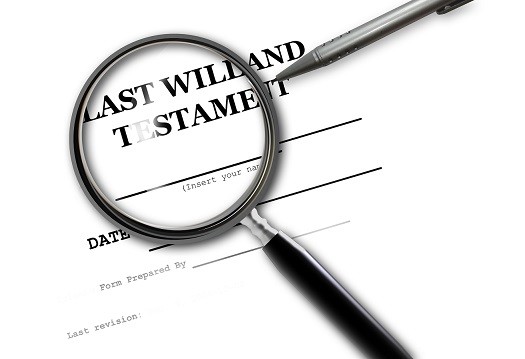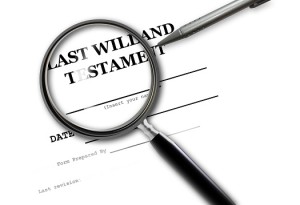



 You may be surprised to learn that the answer is ‘not always’. This is especially the case when the joint owners of a bank or investment account are a parent and an adult child.
You may be surprised to learn that the answer is ‘not always’. This is especially the case when the joint owners of a bank or investment account are a parent and an adult child.
At my law office in the Kanata-Stittsville area of Ottawa, I met with Sharon. Her widowed mother had recently passed away after a brief illness. Her mother’s Will divided the estate equally between Sharon and her brother, Bill.
Unfortunately, a point of contention had arisen between the siblings. At issue were two bank accounts held jointly by Sharon and her mother. Bill was adamant that these two bank accounts should be treated as part of their mother’s estate. Sharon, on the other hand, claimed that because the bank accounts were held jointly, they automatically belonged to Sharon after their mother’s death.

 Life insurance can sometimes be a large part of an estate. Quite understandably, the estate planning clients that I meet with at my law office in the Kanata-Stittsville area of Ottawa as well as the executors (also called estate trustees) have a lot of questions about life insurance. Here are a few of those questions:
Life insurance can sometimes be a large part of an estate. Quite understandably, the estate planning clients that I meet with at my law office in the Kanata-Stittsville area of Ottawa as well as the executors (also called estate trustees) have a lot of questions about life insurance. Here are a few of those questions:

 The New Year brought with it some significant changes that will affect the duties of many executors. Our estate clients at my law office in the Kanata-Stittsville area of Ottawa have had a lot of questions including the following:
The New Year brought with it some significant changes that will affect the duties of many executors. Our estate clients at my law office in the Kanata-Stittsville area of Ottawa have had a lot of questions including the following:

 I recently met with Gerta (not her real name) at my law office in the Kanata-Stittsville area of Ottawa to discuss her estate planning. Gerta was widowed and had two children, a son that lived in Poland and a daughter living in Ottawa. Gerta told me that she wished to appoint her son as executor of her Will as she felt he was more suited to the job than her daughter.
I recently met with Gerta (not her real name) at my law office in the Kanata-Stittsville area of Ottawa to discuss her estate planning. Gerta was widowed and had two children, a son that lived in Poland and a daughter living in Ottawa. Gerta told me that she wished to appoint her son as executor of her Will as she felt he was more suited to the job than her daughter.
I explained to Gerta that although she could name her son as executor (also called an ‘estate trustee’), it could result in considerably more cost and delay for her estate.

 At my law office in the Kanata-Stittsville area of Ottawa, I often get asked this question by parents and other loved ones of a child or adult with a disability. The short answer is, it depends.
At my law office in the Kanata-Stittsville area of Ottawa, I often get asked this question by parents and other loved ones of a child or adult with a disability. The short answer is, it depends.
I recently met with John and Linda (not their real names) to discuss their estate planning. They were considering whether a Registered Disability Support Plan (‘RDSP’) made sense for their disabled adult son, Peter. Given his limitations, however, they didn’t think he would have the capacity to open it for himself. They wondered if they could open it for him.
As I explained to John and Linda, the answer depends upon a few factors:

I recently met with sisters, Sue and Janice (not their real names), at my law office in the Kanata-Stittsville area of Ottawa. Their father had signed a Power of Attorney for Property and a Power of Attorney…

I recently met with Kate (not her real name) at my law office in the Kanata-Stittsville area of Ottawa.  She explained to me that her grandmother had recently passed away and left her a cash gift of $100,000. Kate was concerned about what effect the gift may have on the benefits she receives from the Ontario Disability Support Program (‘ODSP’). She had not yet received her gift but, acting on the advice of her father, she had made an appointment to meet with me sooner rather than later.
She explained to me that her grandmother had recently passed away and left her a cash gift of $100,000. Kate was concerned about what effect the gift may have on the benefits she receives from the Ontario Disability Support Program (‘ODSP’). She had not yet received her gift but, acting on the advice of her father, she had made an appointment to meet with me sooner rather than later.
I told Kate that coming to me before receiving her gift was the right thing to do. It was unfortunate that Kate’s grandmother had not been advised to include a Henson Trust in her Will for Kate’s benefit. There are, however, some steps that Kate can take to protect her ODSP benefits.

 The Ontario government recently brought into force new regulations that change how it deals with estate administration tax (commonly known as probate fees). As of January 1st, 2015, an executor (or estate trustee) is required to complete and file an Estate Information Return (EIR) with the Ontario Ministry of Finance. This is in addition to the court Application for a Certificate of Estate Trustee (commonly known as probate).
The Ontario government recently brought into force new regulations that change how it deals with estate administration tax (commonly known as probate fees). As of January 1st, 2015, an executor (or estate trustee) is required to complete and file an Estate Information Return (EIR) with the Ontario Ministry of Finance. This is in addition to the court Application for a Certificate of Estate Trustee (commonly known as probate).
If an executor fails to file the EIR or if the executor files the EIR and is audited and found to have made “false or misleading statements” on the EIR, the executor is liable, on conviction, to a fine of at least $1,000 plus up to twice the estate administration tax that was not paid. Imprisonment of not more than two years is also possible. Audits can occur up to four years after the court Certificate has been issued.


